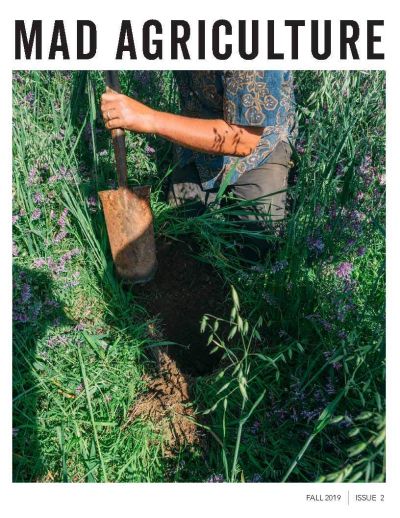
The Mad Agriculture Journal
Issue 2 . Letter from the Editor
Published on
November 01, 2019
Written by
Philip Taylor
Photo by
Jane Cavagnero
Humanity has lived too long at that expense of others and ourselves. Our economy is built on and operated on the extraction of natural capital and human health. There is a radical reformation emerging in humanity, inverting this paradigm of working against nature to working within nature to understand who we are and how we ought to live on Earth. Joanna Macy calls it ‘The Great Turning’. Charles Eisenstein calls it ‘The New & Ancient Story’. It’s unclear how the revolution is going to manifest, but that is the beauty of emergence – it is unpredictable and unknowable.
Emergence is question in motion, and as Rilke reminds us, we must ‘try to love the questions themselves like locked rooms and like books that are written in a very foreign tongue. Do not now seek the answers, which cannot be given you because you would not be able to live them. And the point is, to live everything. Live the questions now. Perhaps you will then gradually, without noticing it, live along some distant day into the answer.’
It is difficult to embrace questions because questions represent uncertainty, especially when society seems to demand clarity, eliminate mystery and reduces life to simple equations. At Mad Agriculture, we are firmly anchored to our mission, yet our strategy, the work, the people, the ideas, the action is actively evolving as we discover ourselves and how we unfold within something much larger than ourselves. This issue of our Mad Agriculture journal illustrates elements of our emergence.
I’ve learned that emergence includes: ordering at the edge of chaos, radical novelty, interaction of unlike kinds, leverage points for catalytic conformation of systems, non-linear learnings, prediction and control are unrealizable, untangling negative feedbacks loops, reinforcing positive feedback loops, self-organization, dynamic tension, rapid adaptation, harmonization of language, discovery of shared experience across disparate sectors and disciplines, the laws of conservation apply, embracing uncertainty is a stabilizing force, paradoxes and contrasting tensions are ever-present, equally true and necessary: fast and slow, dark and light, pain and glory, soft and hard, good and bad, and everything in between.
I feel these dynamics pulling and pushing on all dimensions of my being, as I learn to more fully participate in an expansion of consciousness that is transforming myself as well as my vision for society, and in turn, transmitting through Mad Agriculture, and with like and unlike people, caught in the same unfolding.
To emerge, one must follow their heart song. Looking around for answers will confuse oneself. As Carl Jung advises, ‘Your vision will become clear only when you look into your heart. Who looks outside, dreams. Who looks inside, awakens.’ I believe many others share this experience – hearing a call beyond themselves and yet struggling to answer that call with the fullness of the gifts and skills each has to offer in service of humanity and the Earth.
I’ve recently been asking, what are we emerging toward? Emergence begins with story. As we expand toward and away from the horizon (thanks Gadamer), we are confronted by the need for a new language. On the following two pages I present some of the language shift I am witnessing and participating in. These words and their meaning are guiding our choices in creation and organizing the way we create relationships with people and place.
We are not home, and cannot be, in the world we’ve interpreted. I invite you to leave the worn out ways of seeing and being, let the veils of familiarity fall away, and enjoy the innocence and ignorance of birth and creation. And so, dear reader, what is your dream? What is your vision? The universe is asking you to participate. Can you hear it? I can tell you that it is calling, from within you and without. I can tell you that the universe is expanding the right direction. Heed the call. Emerge.
Love and light,
Phil
